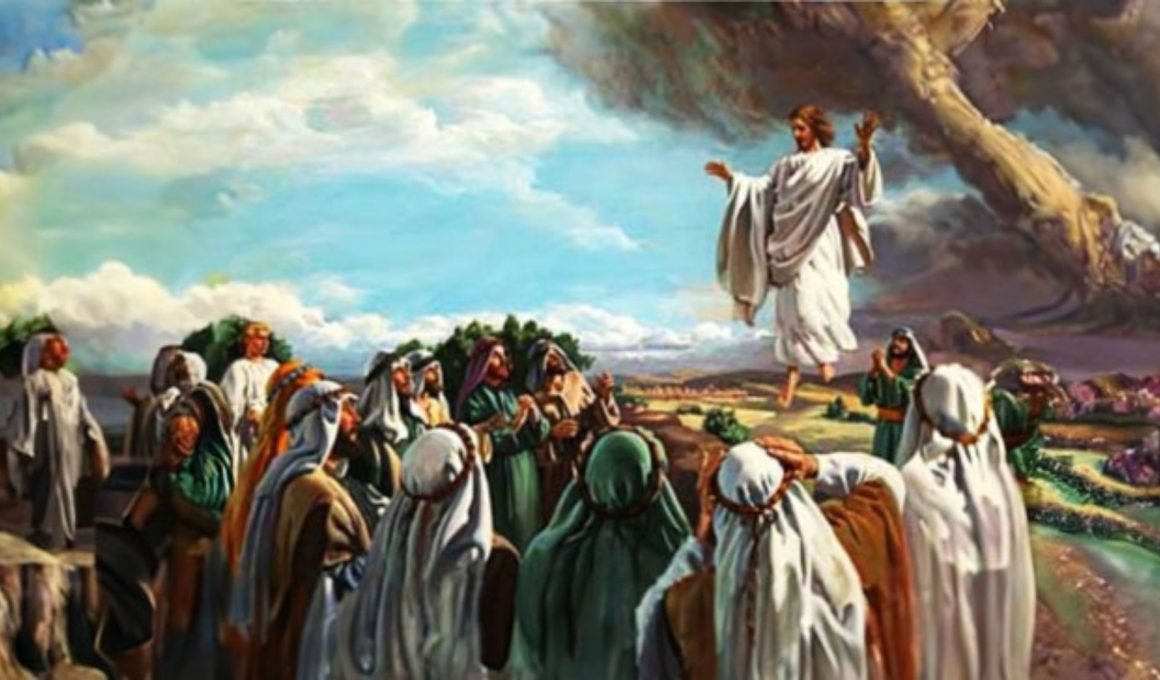The Great Commission, a cornerstone of Christian doctrine, represents Jesus Christ’s instruction to His disciples to spread His teachings to all nations.
Though the exact term “Great Commission” isn’t explicitly stated, its essence resonates across multiple passages in the New Testament.
This article explores nine scriptural facts that collectively highlight how the Great Commission is emphasized in the Bible.
Is the Great Commission Recorded 10 Times in the Bible
The Great Commission is not mentioned 10 times in the Bible. It is primarily documented in five New Testament passages: Matthew 28:16-20, Mark 16:15-18, Luke 24:46-49, John 20:21-23, and Acts 1:8.
Nonetheless, here are 9 scriptural facts about the Great Commission.
1. The Great Commission in Matthew 28:18-20
The most direct and well-known account of the Great Commission is found in Matthew 28:18-20. This passage serves as the definitive articulation of the Commission, where Jesus commands His disciples to make disciples of all nations, baptizing them and teaching them to obey His commands.
Matthew 28:18-20 (NIV): “Then Jesus came to them and said, ‘All authority in heaven and on earth has been given to me. Therefore go and make disciples of all nations, baptizing them in the name of the Father and of the Son and of the Holy Spirit, and teaching them to obey everything I have commanded you. And surely I am with you always, to the very end of the age.'”
In this passage, Jesus asserts His divine authority before commissioning His followers. The command to “make disciples of all nations” highlights the global scope of the mission, emphasizing inclusivity and the universality of the gospel message. The directive to baptize “in the name of the Father and of the Son and of the Holy Spirit” underscores the Trinitarian foundation of Christian faith, while the instruction to teach obedience to Jesus’ commands stresses the importance of discipleship and ongoing spiritual growth. The promise of Jesus’ presence “to the very end of the age” provides assurance and encouragement to believers as they undertake this mission.
2. The Markan Commission
In Mark 16:15-16, a similar directive is given, emphasizing preaching the gospel to all creation and the importance of belief and baptism for salvation.
Mark 16:15-16 (NIV): “He said to them, ‘Go into all the world and preach the gospel to all creation. Whoever believes and is baptized will be saved, but whoever does not believe will be condemned.'”
Mark’s account of the Great Commission places a strong emphasis on the act of preaching the gospel universally. The phrase “all creation” expands the scope of the mission beyond human boundaries, suggesting a comprehensive outreach. The emphasis on belief and baptism as prerequisites for salvation underscores the fundamental aspects of Christian conversion and the importance of faith. The stark contrast between salvation for believers and condemnation for non-believers highlights the eternal significance of the gospel message and the urgency of the mission.
3. The Commission in Luke 24:46-49
Luke’s gospel records Jesus commissioning His disciples to preach repentance and forgiveness of sins to all nations, beginning at Jerusalem. This version highlights the message of repentance and forgiveness as central to the Commission.
Luke 24:46-49 (NIV): “He told them, ‘This is what is written: The Messiah will suffer and rise from the dead on the third day, and repentance for the forgiveness of sins will be preached in his name to all nations, beginning at Jerusalem. You are witnesses of these things. I am going to send you what my Father has promised; but stay in the city until you have been clothed with power from on high.'”
In this passage, Jesus reiterates the prophetic fulfillment of His death and resurrection as the basis for the gospel message. The instruction to preach repentance and forgiveness “in his name to all nations” emphasizes the transformative power of the gospel to bring about spiritual renewal and reconciliation with God. The mandate to begin at Jerusalem underscores the historical and theological significance of this city as the starting point for the spread of Christianity. The promise of being “clothed with power from on high” refers to the coming of the Holy Spirit, which would empower the disciples for their mission.
4. The Johannine Commission
In John 20:21-23, Jesus breathes on His disciples, imparting the Holy Spirit, and sends them out with the authority to forgive sins, reflecting a more spiritual and communal aspect of the Commission.
John 20:21-23 (NIV): “Again Jesus said, ‘Peace be with you! As the Father has sent me, I am sending you.’ And with that, he breathed on them and said, ‘Receive the Holy Spirit. If you forgive anyone’s sins, their sins are forgiven; if you do not forgive them, they are not forgiven.'”
John’s account of the Commission emphasizes the peace and mission continuity between the Father and the Son, and now the disciples. The act of Jesus breathing on His disciples to receive the Holy Spirit signifies a new creation and empowerment for their mission. The authority to forgive sins highlights the profound spiritual responsibility entrusted to the disciples, emphasizing the communal and restorative aspects of their mission.
5. The Commission in Acts 1:8
The Book of Acts begins with Jesus instructing His disciples to be His witnesses in Jerusalem, Judea, Samaria, and to the ends of the earth, emphasizing the geographical expansion of their mission.
Acts 1:8 (NIV): “But you will receive power when the Holy Spirit comes on you, and you will be my witnesses in Jerusalem, and in all Judea and Samaria, and to the ends of the earth.'”
Acts 1:8 highlights the geographical progression of the mission, starting from Jerusalem and expanding outward to encompass the entire world. The reception of the Holy Spirit’s power is crucial for the disciples’ ability to fulfill this mission. This passage sets the stage for the narrative of Acts, where the spread of the gospel is documented through the apostles’ missionary activities, empowered by the Holy Spirit.
6. The Pauline Perspective
Paul’s letters often reflect the spirit of the Great Commission. In 2 Corinthians 5:18-20, Paul speaks of the ministry of reconciliation and the role of believers as Christ’s ambassadors, tasked with spreading the message of reconciliation.
2 Corinthians 5:18-20 (NIV): “All this is from God, who reconciled us to himself through Christ and gave us the ministry of reconciliation: that God was reconciling the world to himself in Christ, not counting people’s sins against them. And he has committed to us the message of reconciliation. We are therefore Christ’s ambassadors, as though God were making his appeal through us. We implore you on Christ’s behalf: Be reconciled to God.'”
7. The Universal Mission in Romans
In Romans 10:14-15, Paul underscores the necessity of preaching the gospel so that all may hear and believe, highlighting the indispensable role of evangelism in fulfilling the Great Commission.
Romans 10:14-15 (NIV): “How, then, can they call on the one they have not believed in? And how can they believe in the one of whom they have not heard? And how can they hear without someone preaching to them? And how can anyone preach unless they are sent? As it is written: ‘How beautiful are the feet of those who bring good news!'”
Paul’s rhetorical questions in Romans 10:14-15 underscore the essential nature of evangelism. The logic follows a clear progression: people cannot call on Christ without believing in Him, they cannot believe without hearing about Him, and they cannot hear without someone preaching. This chain of reasoning emphasizes the critical role of preachers and missionaries in spreading the gospel. The citation of Isaiah 52:7—”How beautiful are the feet of those who bring good news!”—celebrates the mission of those who carry the gospel, recognizing the profound beauty and importance of their task.
8. The Call to Discipleship in Timothy
In 2 Timothy 4:2, Paul exhorts Timothy to preach the word in all circumstances, reflecting the urgency and constancy required in fulfilling the Great Commission.
2 Timothy 4:2 (NIV): “Preach the word; be prepared in season and out of season; correct, rebuke and encourage—with great patience and careful instruction.'”
Paul’s charge to Timothy emphasizes the constancy and readiness required in preaching the gospel. “In season and out of season” implies that Timothy should be prepared to preach regardless of the circumstances—whether convenient or inconvenient, favorable or unfavorable. The instructions to “correct, rebuke, and encourage” highlight the multifaceted nature of pastoral ministry, which involves not only proclaiming the gospel but also addressing errors, providing discipline, and offering encouragement. The call for “great patience and careful instruction” underscores the need for persistence and thoughtful teaching in ministry.
9. The Vision of Revelation
Revelation 14:6 presents an angel proclaiming the eternal gospel to every nation, tribe, language, and people, symbolizing the universal reach of the gospel message in the end times.
Revelation 14:6 (NIV): “Then I saw another angel flying in midair, and he had the eternal gospel to proclaim to those who live on the earth—to every nation, tribe, language and people.'”
In the apocalyptic vision of Revelation, the proclamation of the eternal gospel by an angel signifies the universality and timelessness of the gospel message. The angel’s announcement to “every nation, tribe, language, and people” underscores the inclusivity of the gospel, emphasizing that it is meant for all humanity, transcending ethnic, linguistic, and cultural boundaries. This vision reinforces the Great Commission’s call to reach the ends of the earth with the message of Christ.
Conclusion
While the term “Great Commission” is not explicitly mentioned ten times in the Bible, its essence is conveyed through various passages and teachings across the New Testament.
These scriptural facts collectively underscore the importance of evangelism, discipleship, and the universal call to spread the gospel.
The Great Commission remains a foundational element of the Christian faith, guiding believers to share the message of Christ’s love and redemption with the entire world.







